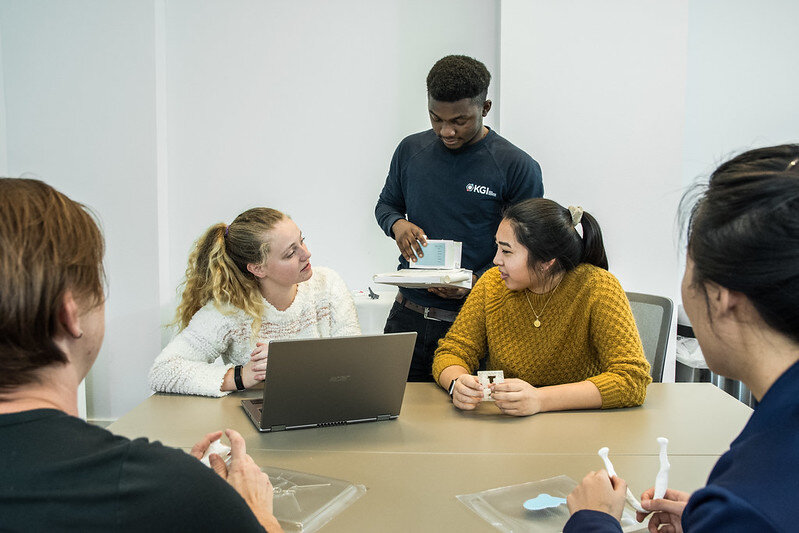The medical device industry is pivotal in elevating healthcare and ensuring the well-being of individuals. Ranging from groundbreaking implants to sophisticated diagnostic equipment, these inventions are the heart of contemporary medical practice.
From Concept to Prototype: Medical Product Design
Medical device design engineers start with a conceptualization stage, where brainstorming and innovation work to address pressing healthcare concerns. Here, the expertise of medical device design engineers comes to the forefront, transforming initial concepts into tangible prototypes.
This phase is crucial, involving exhaustive testing processes to ensure the proposed device’s efficacy and safety. The precision demonstrated during this stage lays the foundation for a medical product that aims to fulfill a specific gap and enhances and safeguards human health.
Regulatory Compliance and Quality Control in Medical Device Development
As the device transitions from the drawing board to reality, a medical device mechanical engineer must ensure it meets the regulatory standards. The commitment to quality is strict, with control measures ensuring compliance with international health authorities. It is a balancing act where safety and innovation must align to protect the end user.
Another significant aspect of medical device mechanical engineering is ensuring that devices operate reliably under a wide range of conditions. Medical devices must perform consistently, whether they are in a controlled hospital setting, a remote outpatient clinic, or within the patient's home. Engineers must consider variables such as temperature fluctuations, mechanical stress, moisture, and exposure to bodily fluids, all of which can affect a device's functionality.
Materials Selection and Sourcing
Selecting the right materials is a foundational aspect of medical device manufacturing. However, one of the challenges medical equipment engineers face is the selection and design of materials that are biocompatible—capable of performing desired functions without eliciting any adverse reactions from bodily tissues.
The complexity of the human body necessitates materials that are not only durable and resilient but also compatible with body tissues to prevent inflammation, rejection, or other complications. Engineers often work closely with materials scientists to develop compounds or to modify existing materials to improve their integration with biological systems. This collaboration might involve the use of advanced polymers, metals, ceramics, or even composites, each selected based on rigorous research and compatibility studies.
Assembly and Production for Medical Equipment Design
Manufacturing medical devices often involve complex assembly and precision engineering, employing techniques from injection molding to 3D printing. Each method has its advantages, challenges, and applications tailored to the unique demands of medical device production.
The Final Check: Sterilization and Packaging Processes
Before a medical device is deemed ready for clinical use, it undergoes rigorous sterilization and packaging to maintain sterility and ensure patient safety. This final step in the manufacturing process is crucial, employing methods that range from steam sterilization to gamma radiation, each chosen based on the device's material composition and intended use. The final stage secures the integrity of the medical device from the production line to its final deployment in a healthcare setting.
Medical Device and Design Collaboration
The field of medical device mechanical engineering thrives on interdisciplinary collaboration. Engineers work closely with medical professionals, biologists, software developers, and regulatory experts to ensure that the devices they develop are not only technologically advanced but also clinically relevant and compliant with health regulations. This collaborative environment fosters a culture of innovation, where knowledge-sharing and collective problem-solving lead to the development of groundbreaking medical technologies.
Medical Device Engineer Jobs
Medical device engineers are at the forefront of technological innovation in healthcare. They are tasked with solving existing challenges and envisioning future capabilities of medical devices. This could involve the creation of more compact, efficient, or intelligent devices capable of providing real-time health monitoring or targeted therapies with minimal invasion. Engineers are pushing the boundaries to offer integrated healthcare solutions that improve patient outcomes and quality of life.
Some career titles include:
- Medical Device Design Engineer
- Medical Device Mechanical/Equipment Engineer
- Embedded Systems Developer
- Medical Device Developer
- Biomedical Equipment Technician
- Medical Software Engineer
- Product Development Engineer
- Validation Specialist
- Quality Assurance Engineer
Transforming the Future of Healthcare with Keck Graduate Institute
Embarking on a career in medical device engineering opens a gateway to a multitude of impactful job roles, each contributing to advancing healthcare technologies and patient care.
Keck Graduate Institute (KGI) stands at the forefront of advancing the field of medical device engineering, offering an innovative MS in Medical Device Engineering program. This program is designed to equip the next generation of engineers with the comprehensive knowledge, skills, and real-world experience needed to lead in the medical device industry. At Keck Graduate Institute, students not only gain an in-depth understanding of the complexities involved in medical device manufacturing but also learn to navigate the regulatory, technological, and ethical challenges of bringing revolutionary medical devices to market.
Discover More About Advancing Your Career in Medical Device Engineering
If you are interested in becoming a device engineer and are eager to advance your career in medical device engineering, you need proper training and education to succeed. Check out the Master of Science in Medical Device Engineering program to dive deeper into our curriculum, learn from our esteemed faculty, and embark on a path that leads to opportunities in transforming healthcare through innovation.
Have questions about our program? Set up an appointment with one of our admissions counselors to start a conversation or request more information.


